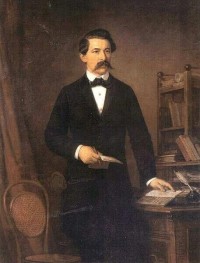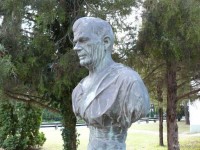Paces King Edward of England
on his royal grey:
“Let us see”, says he, “the Wales Province,
how much it can pay.”
“Are there rivers and fertile soil?
grass thick on pasture heights?
Did the rebels’ blood any good?
Made it more fertile and right?”
“Is the folk content and glad,
that God-given good folk,
as I’d like him to be,
like their cattle in yoke?”
“Yes, Sire, Wales is really
precious diamond on your crown,
where good soil, rivers
hills and valleys are all around.
And the folk is content and glad,
that God-given good folk, Sire.
Their huts are dead silent,
as are the graves all here.”
Paces King Edward of England
on his royal grey:
Silent province, where he went
and muteness all the way.
It’s called Montgomery, the castle,
for the overnight,
It was count Montgomery himself,
entertaining king and knights.
Games and fish and delicacies
appealing to mouth and eye,
hundreds hustling servants around
to watch is just a try.
All, what this fertile land
can bring as foods,
and all the wine from overseas
are here with all the goods.
“Hey, Squires! I need someone,
to say a toast with my drink!
Hey, Squires, you Welsh hounds,
don’t you welcome the King?”
“I see here games, fish and delicacies
appealing to mouth and eyes,
But are all deep in their soul
devils all the knights?”
“You, Squires, disgraceful hounds!
Should not live long Edward?
Where’s a man, who recites my deeds,
where’s a Welshian bard?”
The guests, the nobles of Wales
look on each other and gaze,
the horror like rage turns pale
on their startled face.
No words, no sound,
no respiration heard,
when from behind, a grey Welsh bard
says a relieving word.
“Here is, King, a man”, says the aged,
“who’ll your deeds recite.”
Arms clatter, dying men rattle,
when he hits the harp.
“Arms clatter, dying men rattle,
sun sets in bloody seas,
beasts of the night gather to smell:
King, here are your deeds.
Slaughtered our folk lies
in pile, like shocks of wheat,
crying are those who search for lives:
King, here are your deeds!”
“Take him to stake! The song is rough!”
Cruelly orders Edward.
“We need a milder song today!”
And enters a younger bard.
“Soft evening breeze
raises from Milford Bay,
lament of virgins is mixed in it
and widows’ complaint.
Don’t give birth to slaves, virgin,
you, mother, don’t let them suck!”
And he arrived in time the stake
to catch up the first at the royal buck.
But here comes a brave
and uncalled a third,
new songs on his lute
and with hurting words.
“All the best died in battle
don’t you hear, Edward?
You shan’t find one, who prais’s
your name, not a one Welsh bard.
Their names still sound on the lute,
Listen, you Edward:
curse on your head are all the songs
sung by a Welsh bard.”
“That’s a lie!”, orders
the king, horribly to the guards:
to the stake, who’s against,
all the Welshian bards.
Servants rush over the land
with the order to carry.
So it happened the famous
repast of count Montgomery.
So, races King Edward of England
on his royal grey:
Stakes around him in Wales Province
and mourning all the day.
Five hundred Welsh bards went
singing into fire grave,
but none could shout, not at once,
“Long live Edward, the brave!”
“Hey, what’s this sound, this song
on London’s street tonight?
I’ll order the Lord Mayor hung,
if disturbed by any kind!”
“Silence, Sire, no rustle at all,
to rest went even the flies.”
“Who says a word”, the Lord Mayor says,
“immediately dies!”
“Hey, bring flute, lute and all
trumpets, loud instruments,
I still hear those cursing songs
from Montgomery’s nest!”
But over songs, flutes and drums
and alarming drums dingdong,
Five hundred sings aloud
the martyrs’ glory song.

